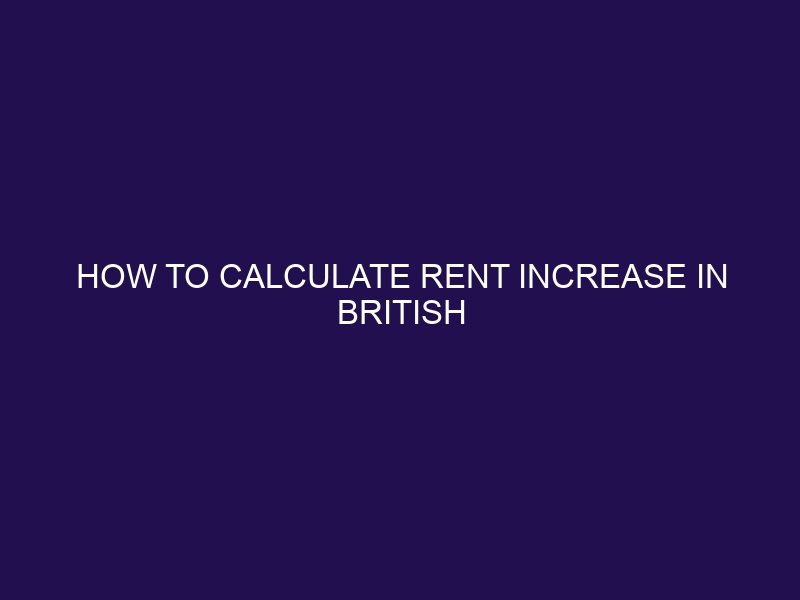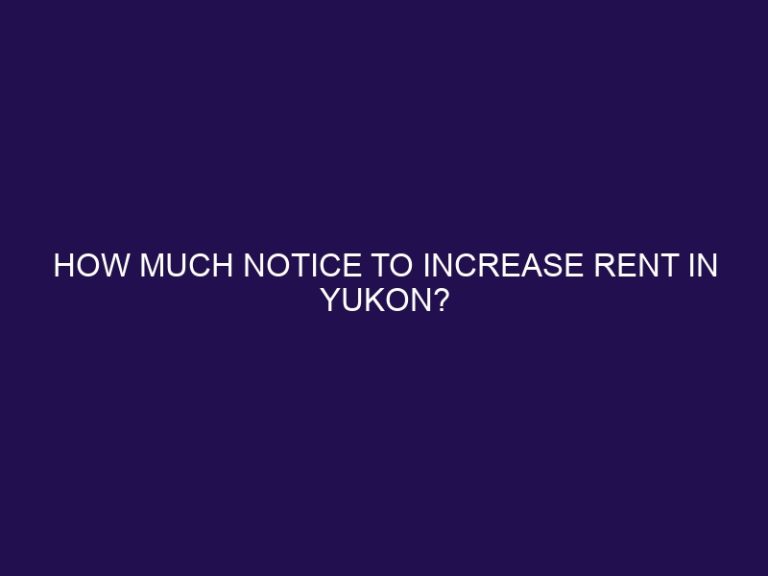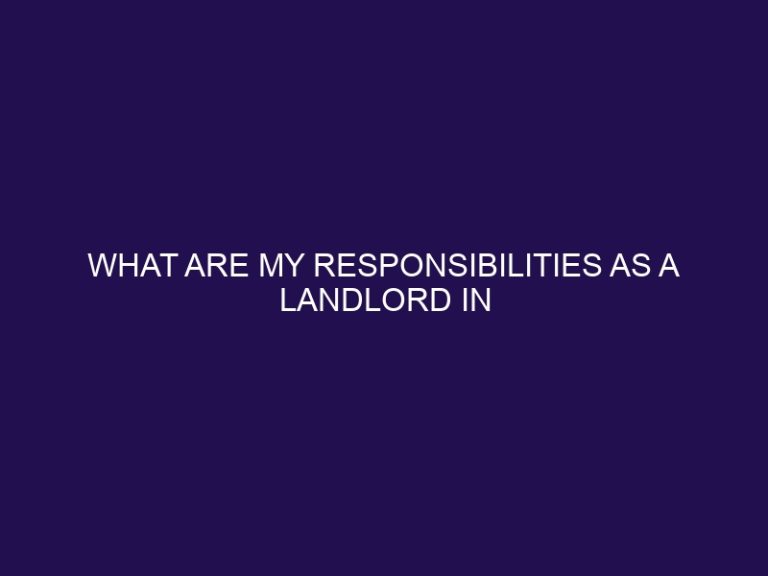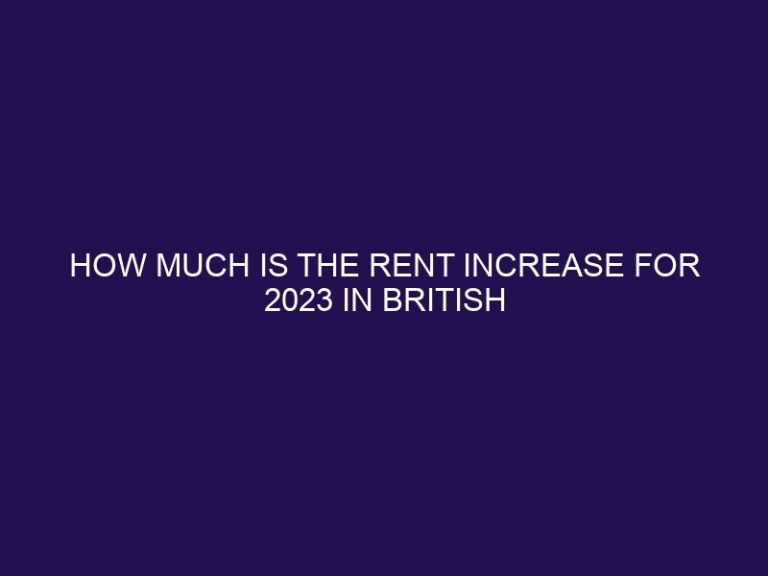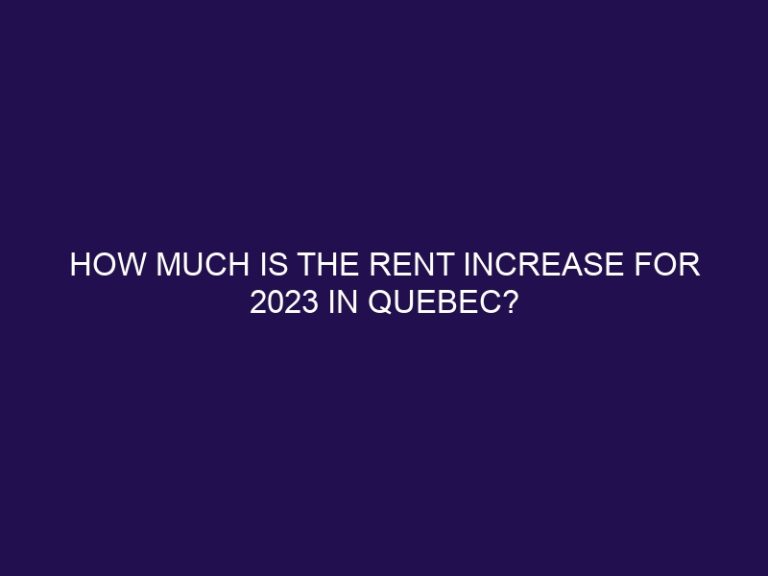How to calculate rent increase in British Columbia?
.jpg)
Understanding Rent Control Laws in British Columbia
Rent control is an important aspect of tenant-landlord relationships, providing guidelines and regulations to ensure fair and reasonable rent increases. In British Columbia, there are specific laws in place to govern rent control and protect tenants from excessive rent hikes. To navigate these regulations and calculate rent increase accurately, it is crucial to have a clear understanding of the rules and procedures.
Rent control, in simple terms, refers to the government’s intervention to restrict the amount by which landlords can increase the rent for residential properties. In British Columbia, the Residential Tenancy Branch (RTB) sets the guidelines for rent control to maintain affordability and stability in the rental market. Understanding the concept of rent control is essential to ensure both landlords and tenants are aware of their rights and obligations.
British Columbia has specific limits on the amount by which landlords can increase rent. The maximum allowable rent increase is determined each year and is based on the “Rent Increase Guidelines” set by the RTB. However, there are exceptions to these limits, which we will discuss in more detail.
In this article, we will delve into the specifics of rent control laws in British Columbia, including the rent increase limits and the exceptions to those limits. We will also discuss the step-by-step process of calculating rent increase to ensure landlords and tenants are informed and can navigate this process accurately. we will explore additional factors to consider in rent increase, such as renovations and tenancy agreements. Finally, we will outline the legal obligations and procedures that landlords must follow, including providing proper notice to tenants and the tenant’s right to challenge a rent increase.
By gaining a comprehensive understanding of rent control laws in British Columbia, both landlords and tenants can ensure a fair and transparent process when it comes to calculating rent increases.
Key takeaways:
- Rent control laws in British Columbia limit the amount landlords can increase rent annually to protect tenants from excessive hikes, but there are exceptions.
- To calculate rent increase, landlords need to determine the applicable rent increase percentage and then calculate the rent increase amount based on the current rent.
- Additional factors that can affect rent increase include renovations, tenancy agreements, providing proper notice to tenants, and tenants’ right to challenge rent increase.
Understanding Rent Control Laws in British Columbia
Understanding rent control laws in British Columbia is crucial for both landlords and tenants. These laws regulate the amount landlords can increase the rent each year and provide protection against sudden and exorbitant increases. The Residential Tenancy Branch of British Columbia provides resources to help both parties understand their rights and obligations. It’s important for landlords to be aware of the allowable annual rent increase percentage, which is based on a formula set by the government. Tenants should familiarize themselves with the regulations to ensure their rent remains within legal limits. Pro-tip: Seeking professional advice can help navigate the complexities of rent control laws.
What is Rent Control?
Rent control refers to regulations that limit how much a landlord can increase the rent on a rental property. In British Columbia, rent control laws are in place to protect tenants from excessive price hikes. These laws set limits on the percentage by which landlords can increase rents each year. The purpose of rent control is to ensure that rental housing remains affordable and stable for tenants. It’s important for both landlords and tenants to understand the specific rules and exceptions that apply in their situation. Pro-tip: Familiarize yourself with the rent control regulations in your area to avoid any potential conflicts or misunderstandings. What is Rent Control?
What are the Rent Increase Limits in British Columbia?
In British Columbia, the rent increase limits are in place to protect tenants. These limits determine how much a landlord can increase the rent each year. So, what are the rent increase limits in British Columbia? Currently, the maximum annual rent increase is determined by a percentage set by the government. For example, in 2021, the allowable increase was 1.4%. It is important to note that there are exceptions to these limits, such as newly constructed rental units that are less than 15 years old. Additionally, landlords must also provide proper notice to tenants before implementing a rent increase. It is crucial for both landlords and tenants to understand these limits to ensure compliance with the law.
What are the Exceptions to Rent Increase Limits?
What are the Exceptions to Rent Increase Limits?
There are certain exceptions to rent increase limits in British Columbia that landlords need to be aware of. These exceptions include situations such as:
1. If the rental unit has undergone significant renovations or repairs that improve its value or extend its lifespan.
2. If the rental unit was previously rented at a below-market rate due to a subsidy or agreement with a non-profit organization.
3. If the rental unit has been converted from non-residential to residential use.
4. If the rent increase is due to the addition of a service or facility to the building that benefits all tenants.
5. If the rent increase is approved by the Residential Tenancy Branch as part of a tenancy agreement.
It’s important for landlords to understand these exceptions and follow the proper legal procedures when considering rent increases.
Calculating Rent Increase in British Columbia
Calculating rent increase in British Columbia can be a daunting task, but fear not! In this section, we’ll break it down for you step by step. First, we’ll dive into how to determine the applicable rent increase percentage. Then, we’ll show you how to calculate the actual rent increase amount. By the end, you’ll have a clear understanding of the process, so you can confidently handle rent increases in BC. No more confusion, just straightforward guidance. Let’s get started!
Step 1: Determine the Applicable Rent Increase Percentage
Step 1: Determine the Applicable Rent Increase Percentage in British Columbia involves the following:
- Check the Rent Increase Guideline set by the government each year.
- Find the applicable rent increase percentage for the current year.
- Consider any additional allowable increases, such as the Permanent Rental Housing Index amount or capital expenditure increase.
- If the rental unit was vacant before the tenancy began, check if an additional increase is allowed.
- Ensure that the rent increase is within the allowable limits and does not exceed the maximum percentage specified by the government.
Step 2: Calculate the Rent Increase Amount
Calculating the rent increase amount in British Columbia involves following a few simple steps:
- Determine the applicable rent increase percentage based on the annual allowable increase set by the government.
- Step 2: Calculate the Rent Increase Amount by multiplying the current rent by the percentage increase.
For example, if the current rent is $1000 and the allowable increase is 2%, the rent increase amount would be $20. Therefore, the new rent would be $1020.
Rent control laws in British Columbia were introduced to protect tenants from excessive rent increases and ensure affordable housing options. These laws aim to strike a balance between the rights of landlords and tenants. By following the correct procedures and calculations, both parties can adhere to the regulations and maintain a fair rental market.
Additional Factors to Consider in Rent Increase
When it comes to calculating rent increases in British Columbia, there are additional factors that landlords and tenants need to keep in mind. In this section, we’ll explore the impact of renovations on rent increases, as well as the rules surrounding annual rent adjustments and tenancy agreements. So, whether you’re a tenant or a landlord, understanding these factors is crucial in navigating the ever-changing landscape of rental agreements in British Columbia. Let’s dive in!
Renovations and Rent Increase
- Renovations can be a reason for landlords to legally increase the rent in British Columbia.
- There are specific steps and considerations that need to be followed in order to increase the rent due to renovations.
- Here are the steps you can take to increase the rent due to renovations:
- Assess the need for renovations and determine the expected cost.
- Notify the tenants in writing about the renovations and the intention to increase the rent.
- Provide a detailed plan of the renovations, including the timeline and any inconvenience that may arise.
- Calculate the allowable rent increase percentage based on the Rent Increase Limits in British Columbia.
- Determine the rent increase amount based on the current rent and the allowable percentage.
- Send a formal notice to the tenants with the calculated rent increase amount and the effective date.
- Ensure that the notice is provided within the required timeframe and adheres to the legal obligations set by the province.
- Allow tenants the right to challenge the rent increase if they believe it is unjustified or unreasonable.
- By following these steps, landlords can navigate the process of increasing rent due to renovations while still adhering to the legal obligations and procedures in British Columbia.
Annual Rent Increase and Tenancy Agreements
- When renting in British Columbia, it is crucial to consider annual rent increase and tenancy agreements. These are important aspects that should not be overlooked.
- Reviewing your tenancy agreement is crucial in understanding the terms and conditions pertaining to rent increases. It is important to note the frequency and notice period specified for rent increases.
- In British Columbia, landlords are permitted to raise the rent once per year, with proper notice. The government determines the maximum allowable rent increase percentage, which can vary on an annual basis.
- Landlords must provide tenants with written notice of the rent increase at least three months prior to it taking effect. This ensures that tenants have sufficient time to plan and adjust their budgets accordingly.
- Tenants have the right to challenge a rent increase if they believe it is excessive or does not comply with the regulations set by the Residential Tenancy Branch. They can seek dispute resolution to resolve the matter.
Legal Obligations and Procedures for Rent Increase
Legal obligations and procedures for rent increase in British Columbia bring forth essential aspects that every landlord and tenant should be aware of. Discover how providing proper notice to tenants and the tenant’s right to challenge rent increases play a pivotal role in maintaining a fair and harmonious rental environment. Get ready to unlock valuable insights and gain a deeper understanding of the crucial procedures involved in rent adjustments within the province.
Providing Proper Notice to Tenants
Providing proper notice to tenants is a critical step in the process of implementing a rent increase in British Columbia. To ensure compliance with legal requirements and maintain a positive landlord-tenant relationship, it is essential to consider the following guidelines:
- Familiarize yourself with the minimum notice period mandated by law, which is a full three months. This means that you must provide the notice to tenants three months in advance of the effective date of the rent increase.
- Ensure that you deliver written notice to tenants, clearly indicating the new rental amount, the date when it will take effect, and providing reasons for the increase if applicable.
- Make sure to keep a comprehensive record of the notice, including copies of any communication sent to the tenant.
- Be proactive and responsive to any inquiries or concerns raised by the tenant regarding the rent increase, and provide clarification whenever necessary.
By adhering to these guidelines, landlords can facilitate a smooth and transparent process of providing proper notice to their tenants.
Tenant’s Right to Challenge Rent Increase
Tenants in British Columbia have the right to challenge a rent increase if they believe it is unjustified. Here are the steps involved in exercising this right:
- Review the legal grounds: tenants have the right to challenge a rent increase if they believe it is unjustified, thereby exercising their tenant’s right to challenge rent increase. Understand the specific reasons for challenging a rent increase, such as non-compliance with the law or improper notice.
- Gather evidence: Collect any relevant documents or evidence to support your case, such as correspondence with the landlord or proof of maintenance issues. This evidence is crucial for tenants exercising their tenant’s right to challenge rent increase.
- Contact the Residential Tenancy Branch: Reach out to the Branch for guidance on the process and to submit your challenge. The Residential Tenancy Branch is a key resource for tenants exercising their tenant’s right to challenge rent increase.
- Attend the hearing: Present your case at the hearing and provide evidence supporting your argument against the rent increase. This step is essential for tenants exercising their tenant’s right to challenge rent increase.
- Wait for the decision: After the hearing, the Branch will provide a decision in writing, outlining whether the rent increase is approved or denied. This decision is essential for tenants exercising their tenant’s right to challenge rent increase.
In a similar case, a tenant successfully challenged a rent increase after demonstrating that it was not in line with the provincial regulations. This resulted in the rent increase being revoked, saving the tenant from unnecessary financial burden.
Some Facts About How To Calculate Rent Increase in British Columbia:
- ✅ The Residential Tenancy Branch (RTB) offers a Rent Increase Calculator to determine the allowable rent increase percentage for this year. (Source: Our Team)
- ✅ TRAC’s website is another resource to find information on rent increase percentages. (Source: Our Team)
- ✅ The RTB also provides other calculators for tenants to use. (Source: Our Team)
- ✅ The Rent Increase Calculator helps tenants figure out when and by how much their landlord can raise the rent. (Source: Our Team)
- ✅ It is important for tenants to be aware of the allowable rent increase percentage to avoid any unfair or illegal rent hikes. (Source: Our Team)
Frequently Asked Questions
1. How can I calculate the rent increase in British Columbia?
To calculate the rent increase in British Columbia, you can use the Residential Tenancy Branch’s Rent Increase Calculator or refer to TRAC’s website for information on rent increase percentages. You need to provide information about the current monthly rent amount and indicate if the rent has been increased in the past. The calculator will determine the allowable rent increase percentage based on the law.
2. Are there different rent increase allowances for tenants in manufactured home parks?
Yes, there are different rent increase allowances for tenants in manufactured home parks. The allowable rent increase percentage may vary for these types of tenancies. It is recommended to check with the Residential Tenancy Branch or TRAC’s website for specific information regarding rent increase regulations for manufactured home park tenancies.
3. What is the maximum allowable rent increase for residential tenancies in 2023?
In 2023, the maximum allowable rent increase for residential tenancies in British Columbia is 2.0%. This percentage is determined by the law and may change annually. It is important for tenants to be aware of this maximum allowable amount to ensure they are not subjected to unfair or illegal rent hikes.
4. What should I do if I suspect an illegal rent increase?
If you suspect an illegal rent increase, you can consult the Residential Tenancy Branch or TRAC’s website for guidance on rent increase laws. It is important to gather evidence, such as rent payment records and any communication with your landlord regarding the rent increase. You may consider reaching out to your housing provider or seeking legal advice if necessary.
5. Does the Residential Tenancy Branch have authority over rent increases for subsidized housing?
No, the Residential Tenancy Branch does not have the authority to make decisions on rent increases for subsidized housing. Subsidized housing, where rent is based on the tenant’s income, is not subject to the rent increase laws. Tenants with questions about rent increases for subsidized housing should discuss it with their housing provider, as they will have specific guidelines and regulations in place.
6. Can the landlord increase the rent for unpaid rent or additional rent increases?
No, the landlord cannot increase the rent for unpaid rent or impose additional rent increases as a form of penalty. Rent increases should occur within the allowable guidelines set by the law, and they must be provided to the tenant with proper notice using the approved form called the Notice of Rent Increase. It is important to understand your rights as a tenant and seek guidance from the Residential Tenancy Branch or TRAC if you believe you are facing an unfair rent increase.

